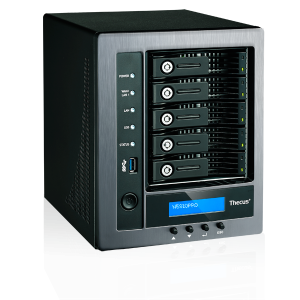Thecus to offer a NAS with integrated uninterruptable power supply
Article
Thecus Adds NAS With UPS Inside | SmallNetBuilder
From the horse’s mouth
Thecus
N5810PRO 5-bay NAS Product Page
My Comments
 A common issue with running a network-attached storage is making sure that the data is intact even if things go wrong with the AC power. This is something that can easily go wrong in regional and rural areas where there is a combination of overhead power lines and overgrowing trees and it just takes a tree or branch to fall down for the power to go out, or if your premises has ageing electrical infrastructure.
A common issue with running a network-attached storage is making sure that the data is intact even if things go wrong with the AC power. This is something that can easily go wrong in regional and rural areas where there is a combination of overhead power lines and overgrowing trees and it just takes a tree or branch to fall down for the power to go out, or if your premises has ageing electrical infrastructure.
Typically this will involve the use of an uninterruptable power supply which effectively is a battery bank for your computer device, giving it a bit of time to properly shut down if the power fails. These are separate devices that you have to buy and plug your NAS into and most of them have the ability to signal to the NAS to appropriately write back the data and properly shut down when the power is out.
But Thecus has solved this problem with the N5810PRO which is a 5-bay small-business NAS that has an integrated uninterruptable power supply. This battery bank provides enough power to cause the NAS to write back all of data to its five disks and properly shut down, but you don’t have to have a separate device to achieve this.
It also has the other expectations of a small-business desktop NAS such as server functionality for a wide variety of tasks alongside even a server-side implementation of McAfee’s anti-virus software. As well, there are the 5 Ethernet ports which allow for serving 5 different physical networks or providing a “fat-pipe” from a suitably-equipped switch. Oh yeah, it also supports SMB/CIFS, DLNA, iTunes for the file transfer and can run multiple RAID volumes across the five disks.
But could I see the integration of a battery backup / UPS function in a NAS become a product differentiator? This could be more so with “small-business” models and the battery capacity could be a product differentiator in itself especially if the goal is to provide long-run failsafe operation.
